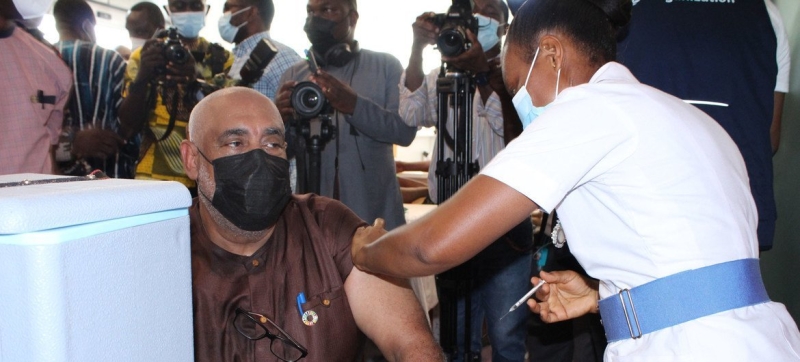- No Media Faced Arson Attacks in 53 Years: Mahfuz Anam |
- Janaza of six Bangladeshi peacekeepers held at Dhaka Cantonment |
- Bangladesh stock market loses Tk 10,500cr in a week |
- Dhaka’s air turns ‘very unhealthy’ on Sunday morning |
- Project to transform N’ganj into a climate-resilient green city |
Nations Adopt Landmark Accord to Prevent Future Pandemics

The UN Resident Coordinator in Ghana, Charles Abani, receives a COVID-19 vaccination (file)
UN Ghana The UN Resident Coordinator in Ghana, Charles Abani, receives a COVID-19 vaccination. File photo
In a historic move following three years of intense negotiations triggered by the COVID-19 crisis, countries have adopted the world’s first international agreement to better prevent, prepare for, and respond to future pandemics.
The decision was made at the annual World Health Assembly, the governing forum of the World Health Organization (WHO). While formal adoption took place on Tuesday, WHO Member States overwhelmingly approved the agreement on Monday, with 124 votes in favour, none against, and 11 abstentions—marking a rare moment of global unity.
“The agreement is a victory for public health, science and multilateralism,” declared WHO Director-General Dr. Tedros Adhanom Ghebreyesus. “It ensures we can better protect the world from future pandemic threats and avoid the devastating losses we experienced during COVID-19.”
The pandemic, which claimed nearly seven million lives and crippled global economies, exposed glaring inequities in access to vaccines, treatments, and diagnostics. The newly adopted agreement aims to address these failings by promoting fairness and efficiency in pandemic response.
Dr. Teodoro Herbosa, President of this year’s Assembly and Secretary of the Philippines Department of Health, described the accord as a “once-in-a-lifetime opportunity” to apply lessons learned from COVID-19 and build a safer, more resilient world.
A key feature of the agreement is its firm protection of national sovereignty. It explicitly states that the WHO will not have the authority to impose lockdowns, mandate vaccines, or override national laws—a clear response to misinformation circulated during the negotiation process.
With adoption secured, attention now turns to implementation. Member States will begin drafting a Pathogen Access and Benefit Sharing (PABS) system through an Intergovernmental Working Group. This annex is expected to be reviewed at the next World Health Assembly.
Once the PABS annex is adopted and 60 Member States ratify the agreement, it will formally enter into force.
Additional provisions include a new financial mechanism to support pandemic prevention and response and a Global Supply Chain and Logistics Network to ensure timely and equitable access to essential health products during public health emergencies.
While hailed as a milestone, WHO officials emphasise that adopting the agreement is only the beginning. Delivering on its promise will require sustained global cooperation, political will, and collective accountability.

